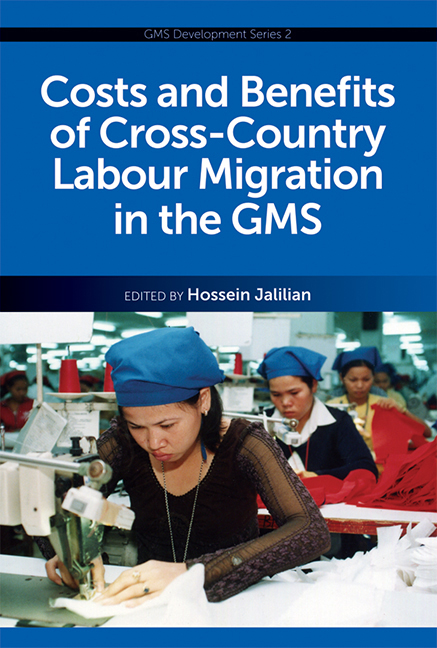Book contents
- Frontmatter
- Contents
- Acronyms and Abbreviations
- List of Figures, Tables and Boxes
- List of Contributors
- 1 Migrants of the Mekong: Wins and Losses
- 2 Economic Costs and Benefits of Labour Migration: Case of Cambodia
- 3 Economic Costs and Benefits of Labour Migration: Case of Lao PDR
- 4 Economic Costs and Benefits of Labour Migration: Case of Thailand
- 5 Economic Costs and Benefits of Labour Migration: Case of Vietnam
- 6 Migrants of the Mekong: Lessons
- Index
1 - Migrants of the Mekong: Wins and Losses
Published online by Cambridge University Press: 21 October 2015
- Frontmatter
- Contents
- Acronyms and Abbreviations
- List of Figures, Tables and Boxes
- List of Contributors
- 1 Migrants of the Mekong: Wins and Losses
- 2 Economic Costs and Benefits of Labour Migration: Case of Cambodia
- 3 Economic Costs and Benefits of Labour Migration: Case of Lao PDR
- 4 Economic Costs and Benefits of Labour Migration: Case of Thailand
- 5 Economic Costs and Benefits of Labour Migration: Case of Vietnam
- 6 Migrants of the Mekong: Lessons
- Index
Summary
INTRODUCTION
The fierce controversy in international migration is barely surprising. At its heart is the poignant debate regarding the universality and territorial application of basic human rights. In this state-centric system, the possession of legal citizenship has been the core basis for awarding a person with full state recognition and the protection of such rights as life, liberty, security, movement, expression, and a standard of living enough to guarantee his or her well-being. Where these rights do not or only partly get fulfilled in their countries of origin, some people venture abroad in the hope of improving their economic, political, and social circumstances. Lacking citizenship in their host countries, migrants in general tend to end up grappling with even greater uncertainty regarding the status of their rights. The tough challenge in translating the principles of non-discrimination and equality into reality for migrants is demonstrated not least by the failure so far to broaden the ratification of and accession to the International Migration Convention. As of April 2009, only forty-three states were parties to this convention (International Steering Committee 2009). The majority of these state parties, none of which are from the Greater Mekong Subregion (GMS), are net sending countries.
The struggle for migrant rights becomes a cause for greater concern if one appreciates how, for many migrants, emigration is fraught with danger and represents a long uphill battle against the constraints of poverty and freedoms. The journey has become more onerous with the marriage of migration, national security, and crisis management policies. Especially vulnerable are those conveniently classified as irregular migrants, though in reality some of these are refugees, stateless, or have been trafficked. Throughout the migration cycle, these migrants are at risk of abuse, enslavement, social exclusion, imprisonment, and deportation. Reaping net economic gains from overseas employment forces them to take informal, riskier routes to destination countries and reject registration opportunities to avoid tax payments and contributions to funds that are earmarked to fund their repatriation.
- Type
- Chapter
- Information
- Publisher: ISEAS–Yusof Ishak InstitutePrint publication year: 2012

